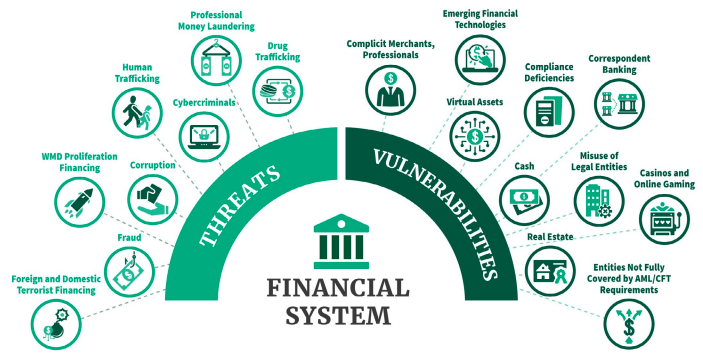
Key Threats and Vulnerabilities from the 2024 National Risk Assessments, https://home.treasury.gov/system/files/136/2024-Illicit-Finance-Strategy.pdf
On 16 May 2024, the U.S. Department of Treasury (Treasury) issued the 2024 National Strategy for Combatting Terrorist and Other Illicit Financing (Strategy), which identifies three high-level goals, four priorities, and 15 supporting actions to guide U.S. government efforts in addressing the most significant illicit finance threats to the US financial system. Criminals capitalize on key vulnerabilities in the U.S. anti-money laundering/countering the financing of terrorism (AML/CFT) regime to bypass systems designed to detect and prevent illicit financial activity, such as human trafficking, fraud, drug trafficking, corruption, cybercrime, trade-based money laundering, professional money laundering organizations, etc. Annex 1 and Annex 2 provide details on illicit finance threats and vulnerabilities. Strategy measures include efforts to investigate and prosecute criminals, leverage economic and financial sanctions to disrupt illicit activity, and recover illicit proceeds to deter and prevent future crimes.
Human Trafficking
So what does the 2024 Strategy say about human trafficking other than it being among the most concerning or consequential illicit finance threats?
The 2026 Benchmarks for Progress for Human Trafficking (Supporting Action 9: Prioritize Targeted Measures and Interagency and Multilateral Coordination to Disrupt Illicit Finance Activity, 9.1: Law Enforcement Action, page 24), includes:
- Enhance training on financial aspects of human trafficking investigations.
- Leverage financial intelligence and anti-money laundering expertise to strengthen investigations and prosecutions of transnational human trafficking enterprises.
- Deploy administrative and regulatory tools to disrupt human trafficking.
In February 2024, the United States Department of the Treasury and the government of Mexico, as well as representatives from global financial institutions, convened to discuss ways to increase cross-border information sharing to counter cross-border financial crimes, such as those involving the laundering of the proceeds related to fentanyl precursors trafficking, human trafficking, fraud, and corruption, carried out by transnational criminal organizations (TCOs) (READOUT: Treasury Officials Visit Mexico to Further Collaboration on Illicit Finance). The financial institutions and authorities also discussed potential ways for authorities to share more operational information with financial institutions in both jurisdictions to tackle common threats, such as illicit finance related to fentanyl precursors and human trafficking (Supporting Action 11: Strengthen Implementation of Global AML/CFT Standards, 11.3: Robust Information Sharing and Joint Action with Foreign Partners, pages 32-33).
The predicate crimes that generate the largest amount of criminal or illicit proceeds laundered in or through the United States include: (1) fraud, which is the largest revenue-generating crime; (2) drug trafficking; (3) cybercrime; (4) human trafficking and human smuggling; and (5) corruption. Criminals use traditional and novel techniques to exploit a variety of vulnerabilities in the U.S. AML/CFT regime, as shown in Annex 2. Criminals are more frequently using professional money launderers to help disguise and hide their illicit funds. These actors obfuscate the source of the funds through networks of shell, front and legitimate companies, unlicensed money transmission, and the provision of supporting documentation (Annex 1: Illicit Finance Threats, Money Laundering Threats, page 38).
Annex 3: Progress on Priorities and Supporting Actions from the 2022 Strategy, Priority 3: Enhance Operational Effectiveness in Combating Illicit Finance, Supporting Action 9 Prioritizing Targeted Measures and Interagency Coordination to Disrupt Illicit Finance Activity, includes:
- 9.1 Law Enforcement Action, Human Trafficking (page 45), includes:
- Treasury issued sanctions targeting persons for conduct related to human trafficking or labor issues, including for serious human rights abuse aboard distant water fishing vessels, and for systemic and pervasive sex trafficking activity.
- FinCEN and the DOJ each conducted multiple training events for domestic law enforcement on how to proactively identify human trafficking cases using BSA data and other Treasury resources.
- FinCEN and IRS-CI supported multiple successful criminal investigations and prosecutions involving sex trafficking and forced labor.
- Treasury coordinated interagency efforts with law enforcement agencies to seek opportunities to use Treasury’s financial tools to disrupt the financially motivated sextortion of minors.
- 9.2 Financial Sanctions (page 46): Since December 2021, OFAC has imposed EO 14059 sanctions on 163 individuals and 114 entities engaged in drug trafficking, with a principal focus on disrupting the illicit fentanyl supply chain. Such designations included disrupting alternative drug trafficking organization revenue streams, including human trafficking and timeshare fraud.
In summary, the Strategy considers human trafficking among the most significant illicit finance risks. Human trafficking illicit actors threaten U.S. national security access to the U.S. financial system and must be held accountable for the harm they inflict. Implied in the Benchmarks is following the money and trends, predicting patterns to anticipate illicit activity, incorporating survivor insights into detection scenarios, understanding how traffickers may react to disruption(s), etc. However, the ultimate test of the Strategy will be the U.S. government providing the necessary capabilities and resources to address the human trafficking benchmarks.
16 HT refs
Pg 6
Appraising the Illicit Finance Threat Environment’s Impact on the U.S. Financial System The United States continues to face a variety of illicit finance threats, the most concerning or consequential of which are consistent with the National AML/CFT Priorities,2 including fraud, drug trafficking, cybercrime, corruption, transnational criminal organizations, professional money laundering organizations, human trafficking, human smuggling, and those seeking to finance terrorism and the proliferation of weapons of mass destruction (WMD).
Pg 9
Key Threats and Vulnerabilities from the 2024 National Risk Assessments
As outlined in the 2024 National Risk Assessments (NRAs),9 the United States faces a variety of illicit finance threat actors, including drug trafficking organizations, professional money launderers, financial fraudsters, corrupt officials, cybercriminals, human trafficking and human smuggling networks, and those seeking to finance terrorism and the proliferation of WMDs
Pg 24
Supporting Action 9: Prioritize Targeted Measures and Interagency and Multilateral
Coordination to Disrupt Illicit Finance Activity
The United States continues to face a multitude of serious and evolving threats, including fraud, drug trafficking, corruption, foreign and domestic terrorism, cybercrime, human trafficking, human smuggling, trade-based money laundering (TBML), professional money laundering organizations (PMLOs), and nature crime.
Pg 27
Drug Trafficking:
• Consider the need for further guidance to financial institutions on how to detect financing related to precursors and equipment linked to fentanyl and other synthetic opioids.
• Continue to engage bilaterally with key jurisdictions, including Mexico, the PRC, and Canada.
Pursue enhanced United States – Mexico cross-border information sharing, in accordance with current law, to disrupt cross-border crimes with a financial component, including fentanyl distribution, arms trafficking, human smuggling, and human trafficking.
Pg 28
Human Trafficking:
• Enhance training on financial aspects of human trafficking investigations.
• Leverage financial intelligence and anti-money laundering expertise to strengthen investigations and prosecutions of transnational human trafficking enterprises.
• Deploy administrative and regulatory tools to disrupt human trafficking
Pg 36
In February 2024, the United States Department of the Treasury and the government of Mexico, as well as representatives from global financial institutions, convened to discuss ways to increase cross-border information sharing to counter cross-border financial crimes, such as those involving the laundering of the proceeds related to fentanyl precursors trafficking, human trafficking, fraud, and corrupttion, carried out by transnational criminal organizations (TCOs).
Pg 42
Money Laundering Threats:93
The predicate crimes that generate the largest amount of criminal or illicit proceeds laundered in or through the United States include: (1) fraud, which is the largest revenue-generating crime; (2) drug trafficking; (3) cybercrime; (4) human trafficking and human smuggling; and (5) corruption.
Pg 49
Human Trafficking
• Treasury issued sanctions targeting persons for conduct related to human trafficking or labor issues, including for serious human rights abuse aboard distant water fishing vessels, and for systemic and pervasive sex trafficking activity.
• FinCEN and the DOJ each conducted multiple training events for domestic law enforcement on how to proactively identify human trafficking cases using BSA data and other Treasury resources.
• FinCEN and IRS-CI supported multiple successful criminal investigations and prosecutions involving sex trafficking and forced labor.
• Treasury coordinated interagency efforts with law enforcement agencies to seek opportunities to use Treasury’s financial tools to disrupt the financially motivated sextortion of minors.
Pg 50
• Since December 2021, OFAC has imposed EO 14059 sanctions on 163 individuals and 114 entities engaged in drug trafficking, with a principal focus on disrupting the illicit fentanyl supply chain. Such designations included disrupting alternative DTO revenue streams, including human trafficking and timeshare fraud.
9.2 Financial Sanctions, pg 46)
TRM LabsTRM Labs27,113 followers27,113 followers
U.S. Department of the Treasury released its 2024 Illicit Finance Strategy: A blueprint for US government efforts to effectively address the most significant illicit finance threats to the US financial system.
The report addresses scams and frauds, ransomware, opioids, terrorism, corruption, and criminal exploitation of technological advances in payments and financial products and services. More recent events, according to the report—such as Hamas’ terrorist attack on Israel and Russia’s continued full-scale invasion of Ukraine—have shaped the illicit finance risk environment.
So what does the report say about the use of virtual currencies?
➡️ The report focuses on the need to fill AML/CFT gaps—including in the decentralized finance space—and the need for additional resources and authorities for Treasury’s Financial Crimes Enforcement Network; IRS; and sanctions regulator, OFAC.
➡️ The report highlights the use of sanctions in the the digital assets space—including against crypto mixing services—and emphasizes the importance of public-private collaboration, including through the use of blockchain intelligence.
TRM is proud to support the US Treasury and regulators globally to mitigate the risk of illicit finance in virtual currencies.
Read the full report here https://lnkd.in/e8U8EKTX ⬇️
🗞️ And if you haven’t already, be sure to subscribe to The Weekly Roundup newsletter: Your source for the latest news on #crypto regulation, #compliance, and #investigations, curated by TRM Labs’ team of global policy experts: Ari Redbord, Angela Ang, and Isabella Chase.



